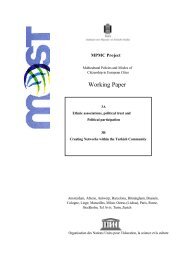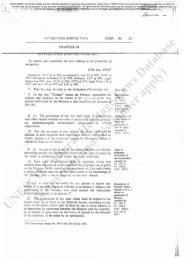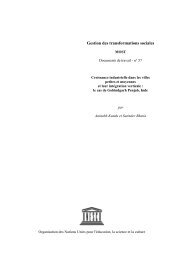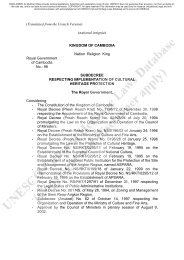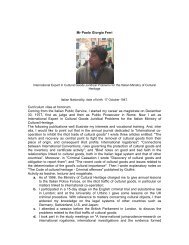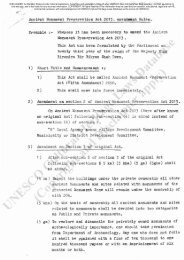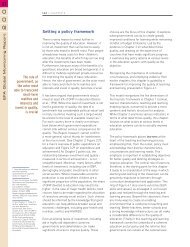Chapter 2. Progress towards the EFA goals - Unesco
Chapter 2. Progress towards the EFA goals - Unesco
Chapter 2. Progress towards the EFA goals - Unesco
Create successful ePaper yourself
Turn your PDF publications into a flip-book with our unique Google optimized e-Paper software.
PROGRESS TOWARDS THE <strong>EFA</strong> GOALS<br />
Introduction<br />
Introduction<br />
The Dakar Framework for Action, adopted by<br />
164 governments in 2000, is one of <strong>the</strong> most<br />
comprehensive, wide-ranging and ambitious of<br />
all commitments undertaken by <strong>the</strong> international<br />
community. It pledges to expand learning<br />
opportunities for every youth, adult and child –<br />
and to achieve specific targets in key areas by 2015.<br />
With just five years to go to <strong>the</strong> target date, this<br />
chapter of <strong>the</strong> Report monitors progress <strong>towards</strong><br />
<strong>the</strong> Education for All <strong>goals</strong> set under <strong>the</strong> Dakar<br />
Framework. Effective monitoring is vital to<br />
achieving international development targets. Apart<br />
from keeping <strong>the</strong> <strong>goals</strong> <strong>the</strong>mselves in <strong>the</strong> spotlight,<br />
it can highlight examples of success, provide early<br />
warning of failure, inform policy and support<br />
advocacy. At an international level, measuring<br />
progress <strong>towards</strong> shared <strong>goals</strong> gives insight into<br />
<strong>the</strong> strengths and weaknesses of national<br />
strategies. It demonstrates what can be achieved<br />
in practice and shows that all countries, whatever<br />
<strong>the</strong>ir level of development, can make progress<br />
under strong political leadership. Above all,<br />
monitoring provides a tool to hold governments<br />
accountable for <strong>the</strong> degree to which <strong>the</strong>y act on<br />
<strong>the</strong> commitments <strong>the</strong>y undertake at international<br />
summit meetings.<br />
This chapter starts by highlighting <strong>the</strong> importance<br />
of early childhood care and education in creating<br />
<strong>the</strong> foundations for lifelong learning. It <strong>the</strong>n<br />
monitors progress <strong>towards</strong> universal primary<br />
education, an area which raises serious concerns.<br />
While <strong>the</strong> number of children not attending school<br />
continues to fall, <strong>the</strong> most recent school enrolment<br />
data suggest that <strong>the</strong> goal of universal primary<br />
education by 2015 will be missed. Moreover,<br />
household survey evidence suggests that more<br />
children may be out of school than <strong>the</strong> official<br />
data indicate. <strong>Progress</strong> in school participation<br />
continues to outstrip progress in learning<br />
achievement, pointing to a widening gap between<br />
quantitative and qualitative indicators of progress.<br />
The chapter fur<strong>the</strong>r shows that advances in adult<br />
literacy fall far short of <strong>the</strong> <strong>goals</strong>. Meanwhile,<br />
technical and vocational education programmes<br />
have – at best – a mixed record in responding<br />
to <strong>the</strong> learning needs of youth and young adults.<br />
Financing is critical to accelerating progress<br />
<strong>towards</strong> <strong>the</strong> Education for All <strong>goals</strong>. Current global<br />
estimates of <strong>the</strong> financing required to meet <strong>the</strong><br />
2015 targets are outdated and methodologically<br />
flawed, primarily because <strong>the</strong>y do not take into<br />
account <strong>the</strong> cost of reaching disadvantaged groups.<br />
This Report provides an updated analysis of <strong>the</strong><br />
financing needed to reach key targets, adjusted for<br />
<strong>the</strong> incremental cost of extending opportunities to<br />
disadvantaged groups. The analysis shows that<br />
financing gaps have been underestimated and that<br />
developing country governments and aid donors will<br />
have to act with urgency to close <strong>the</strong>se gaps.<br />
Monitoring is about more than technical<br />
measurement of progress. This chapter highlights<br />
<strong>the</strong> strong connections between progress <strong>towards</strong><br />
specific <strong>goals</strong> and underlying problems of<br />
inequality and social marginalization, which<br />
<strong>Chapter</strong> 3 examines fur<strong>the</strong>r. While national data<br />
help illuminate broad trends, <strong>the</strong>y can obscure<br />
underlying disparities. Gender disparities are<br />
narrowing in many areas, but young girls and<br />
women continue to face disadvantages at several<br />
levels, from early childhood, through primary and<br />
secondary school, and into adulthood. Wider<br />
inequalities linked to poverty, language, ethnicity,<br />
region and o<strong>the</strong>r factors also restrict opportunity<br />
on a global scale.<br />
Global monitoring exercises inevitably reveal<br />
complex and varied patterns. Two broad messages<br />
emerge from <strong>the</strong> detail of national and regional<br />
progress reports on <strong>the</strong> Education for All <strong>goals</strong>.<br />
The first is good news: <strong>the</strong>re is unequivocal<br />
evidence that <strong>the</strong> world is moving in <strong>the</strong> right<br />
direction, with many of <strong>the</strong> poorest countries<br />
registering impressive advances on many fronts.<br />
Their record demonstrates what is achievable<br />
– and shows that many of <strong>the</strong> 2015 <strong>goals</strong> are still<br />
within reach. The second message is cautionary,<br />
with a ‘bad news’ element: on current trends,<br />
progress <strong>towards</strong> <strong>the</strong> Dakar <strong>goals</strong> is far too slow<br />
to meet <strong>the</strong> 2015 targets. An underlying problem<br />
is <strong>the</strong> failure of many governments to put higher<br />
priority on policies that extend opportunities<br />
to <strong>the</strong> most marginalized sections of society.<br />
Failure to change this picture will result in<br />
<strong>the</strong> international community falling far short<br />
of <strong>the</strong> promise made at Dakar in 2000.<br />
<strong>Progress</strong> <strong>towards</strong><br />
<strong>the</strong> Dakar <strong>goals</strong><br />
is far too slow<br />
to meet <strong>the</strong> 2015<br />
targets<br />
41



